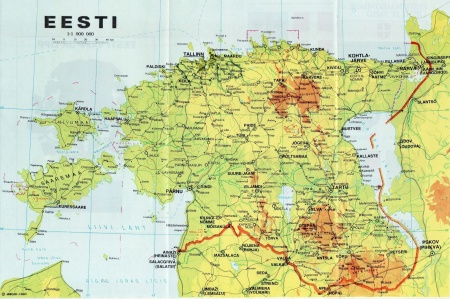Эстония: краткая справка
Эстония - самая северная из трех бывших советских республик Прибалтики. Это маленькая страна, большая часть территории которой покрыта лесами.
 |
|
Флаг Эстонии
|
Такие перемены почти немыслимо было представить себе в таком еще недавнем советском прошлом.
Эстония входила в состав Российской империи до 1918 года, когда она провозгласила независимость. Россия признала Эстонию как независимое государство по Тартускому договору 1920 года.
За этим последовало два десятилетия, в течение которых Эстония пыталась обрести себя как нация в непростых международных условиях - на западе, в Германии, поднимал голову нацизм, тогда как на востоке, в СССР, торжествовал сталинизм.

Таллинн - столица Эстония
|
В 1940 году, вскоре после подписания пакта между Сталиным и Гитлером, в Эстонию вошли советские войска, и она была включена в состав СССР. В следующем году советские войска были вытеснены немецко-фашистскими, но в 1944 Красная армия вновь вступила в Эстонию и осталась на еще почти полвека.
Развитие советской плановой экономики привело к тому, что в работать и жить Эстонии приехали сотни тысяч людей из других частей СССР. Эстонцев такой наплыв заставил опасаться, что их собственные национальные традиции со временем просто исчезнут.
В настоящее время до трети населения страны составляют русские.
Советское наследие продолжает сказываться и сейчас, когда страна уже вступила в ЕС: многие русскоговорящие жители страны жалуются на дискриминацию, утверждая, что строгие законы о языке затрудняют и трудоустройство, и получение гражданства без достаточного владения эстонским. Некоторые из родившихся в Эстонии русских либо не могут, либо не желают стать гражданами из-за требований к знанию государственного языка.
В мае 2005, после целого десятилетия переговоров, Эстония подписала договор о границе с Россией. Договор вскоре ратифицировал эстонский парламент, внеся при этом в текст упоминание советской оккупации. Москва в ответ заявила, что отзывает свою подпись под договором, и что все переговоры должны начаться заново.
Эстонский язык близок к финскому, но не имеет ничего общего ни с языками соседних Латвии и Литвы, ни с русским. Эстония сохранила уникальные традиции фольклорного пения и стихосложения, которые не исчезли, несмотря на многие века иноземного господства.
Cо времени вступления в ЕС в Эстонии наблюдается быстрый экономический рост.
- Официальное название: Эстонская Республика
- Население: 1,3 млн чел. (данные ООН, 2005)
- Столица: Таллинн
- Площадь: 45 227 кв.км
- Основные языки: эстонский, русский
- Основная религия: христианство
- Средняя продолжительность жизни (муж./жен.): 65 лет/77 лет (данные ООН)
- Денежная единица: 1 крона = 100 центов
- Основные статьи экспорта: машинное оборудование, текстиль, продукция деревообрабатывающей промышленности
- Среднегодовой доход на душу населения: 9 100 долларов (данные Всемирного банка, 2006)
- Домен в интернете: .ее
- Международный телефонный код: +372

Президент Тоомас Ильвес
|
Ильвес был приведен к присяге как новый президент Эстонии в октябре 2006.
Глава государства является верховным главнокомандующим вооруженных сил и представляет Эстонию за рубежом. Однако в целом роль президента - церемониальная.
Он избирается сроком на пять лет членами парламента и официальными лицами из местных органов власти.
Премьер-министр: Андрус Ансип

Андрус Ансип ранее был мэром Тарту
|
Андрус Ансип стал первым в постсоветской Эстонии действующим премьер-министром, которому удалось сохранить свой пост после очередных выборов. Он стал премьером в апреле 2005, а в марте 2007 года его правоцентристская Реформистская партия победила на парламентских выборах, правда с маленьким преимуществом, недостаточным для того чтобы сформировать правительство самостоятельно.
Когда правительство приступило к работе, Ансип обнародовал планы сокращения налогов и увеличения расходов на оборону в соответствии с обязательствами страны перед НАТО, a также меры, которые должны ускорить переход на единую европейскую валюту.
Первоначально премьер пытался обеспечить такой переход уже к 2007 году, однако из-за высокой инфляции правительство вынуждено было пересмотреть свои планы.
Перед выборами в марте 2007 Ансип поддержал вызвавший немало споров законопроект, который позволил демонтировать памятник советскому солдату в Таллинне. В Москве закон и последовавший за ним перенос памятника вызвал бурю негодования.
Андрусу Ансипу на момент назначения его премьером было 48 лет. В национальную политику он пришел лишь в 2004 году, побыв до этого мэром Тарту - второго по значению города Эстонии.
В состав его первого кабинета входили представители левоцентристской Партии центра и центристского Народного союза. Это было восьмое правительство Эстонии за последние 12 лет.
В области электронных СМИ с 1991 года наблюдается небывалый рост. На этом рынке в Эстонии действуют и ряд зарубежных компаний - владельцами двух основных коммерческих телекомпаний являются концерны из Швеции и Норвегии.
Общественное вещание в стране ведут Эстонское телевидение (ЭТВ) и Эстонское радио (ЭР).
Немалое количество эстонцев смотрят кабельное телевидение. Здесь представлены каналы, ведущие вещание не только по-эстонски, но также на финском, шведском, русском и латышском языках.
В последнее время Эстония пользуется репутацией страны, активно внедряющей новейшие технологии. Опрос, проведенный в июне 2007, показал, что интернетом там пользуются 768 тысяч человек - 65% населения. В 2007 году Эстония стала первым в мире государством, опробовавшим на парламентских выборах голосование по электронной почте.
Пресса
- "Постимеэс" - ежедневная газета
- "Ээсти Пяэвалехт" - ежедневная газета
- "СЛ Охтулехт" - вечерняя газета для массового читателя
- "Маалехт" - еженедельник
- "Эстония" - на русском языке
- "Ярипяэв" - ежедневная газета для деловых кругов
- Телевидение
- Эстонское телевидение (ЭТВ) - общественное вещание
- "ТВ3" - частная телекомпания
- "Канал 2" - частная телекомпания
-
-
Радио
- Эстонское радио - четыре канала общественного вещания, включая ведущую станцию "Викерраадио"
- "Раадио Эльмар" - частная музыкальная радиостанция
- Радио "Куку" - первая в стране частная радиостанция
-
-
Агентство новостей и интернет
- БНС (Балтийская служба новостей) - частное информагентство
- Delfi - портал новостей на русском и эстонском языках
Справка подготовлена Службой мониторинга Би-би-си
-
-
АУДИО/ВИДЕО
Гимн Эстонской Республики
![]()
![]()
Сентябрь 2003. Референдум
Президент Рюйтель благодарит народ Эстонии, проголосовавший за вступление в ЕС
![]()
ССЫЛКИ
Similar articles:
Государственное устройство → Государственное управление
История → Провозглашение Эстонской Республики
История → Восстановление независимой Эстонской Республики

